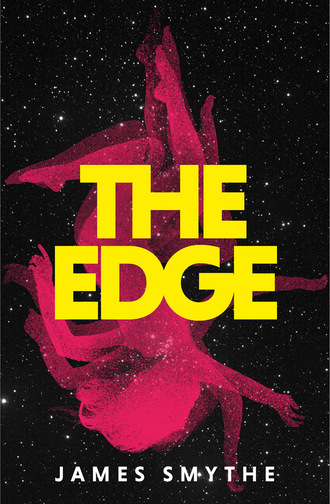
The Edge
‘A million to one. More. A trillion. But still: there’s always a chance.’ He motions towards the sofa. Shuffles, then sits, lowering himself onto the cushion. Sighing, as he does so. ‘It’s strange: you would think that the pain would abate as the broken pieces inside my body are replaced with the artificial. But, alas.’ He shakes his arm. ‘And this, of course. This one will not heal well. The skin is too thin.’
I drag him back to topic. ‘So, you believe him? You think the Anomaly is, what? Alive?’
‘It’s a possibility. Consider our egos: that we assume an alien life form might somehow be similar to ourselves. We assume a bipedal physicality, the construction of devices, of spaceships, of civilizations. We assume that any other life form might have evolved on our plane of existence, alongside us somehow. And yet, our own evolution came from something we call LUCA – the last universal common ancestor. Nothing more than a single-celled organism, really, from which all life on our planet evolved. But that’s only one path. The paths we didn’t take, that birds didn’t take, or lizards: they are infinitesimal. And that’s before you get to creatures that didn’t evolve from the same amoebae as we did. Who is to say that the Anomaly isn’t something evolved? Who’s to say it isn’t the first stage of an evolution? Who, indeed, is even to say it isn’t our own evolution’s ending.’ He nods, as if this makes sense. A theory he’s long had. ‘My brother was many things, but he was not stupid. If he believed that it was alive … Maybe there is stock to be placed in that.’
A life form.
Which would make entering it first contact. Or, something close.
He smiles. ‘There are few enough of us here that we only need the one ship to return to Earth. So Ukonvasara, eminently viable for my desired purposes, is available.’
‘They won’t miss it?’
‘Sometimes things slip through the net.’
‘Like spaceships, sure.’
Nothing shakes the smile. ‘I enjoy sarcastic women, you know. Very much enjoy them. I will share something with you now,’ he says. ‘I have been planning this for a while.’ He says the words slowly, splitting each syllable into its own mouthful. ‘I want to reroute some of our power, our batteries to it. Give it more oomph, shall we say?’
‘More oomph. Another missile. We’ve tried that so many times,’ I say, but he shakes his head.
‘Not a missile, I told you. No, no. We come in peace,’ he says. ‘I want the craft to journey further. Some tweaks, yes, sending signals. But I want to see if we can find what Mirakel found: evidence. And, in doing so, perhaps we can map it a little more, get some idea of how large it is.’
‘We know how large it is.’
‘No! Not at all. We know how large we have guessed, based on curves and algorithms and equations. But maths isn’t everything, you know? Maths is barely anything. Perception is closer to fact, sometimes. It involves less guesswork. You helped to create these wondrous inventions.’ He says it with no small amount of pride, I think; even though we barely know each other, it’s as if he’s taking ownership of this, of me. Responsibility. ‘I am going to need your help for this. We will map it; and we will try to talk with it.’ He sees my face. I don’t know what look I am pulling, but he sees it. ‘Don’t be so alarmed.’ He leans close. Conspiratorial. ‘Maybe we commune with it. Send a message. Something like the golden records on the Voyager probes. Something to afford it knowledge of us, of what we are; and maybe, even, us of it.’
‘It most likely isn’t alive,’ I say. ‘It’s most likely a spatial anomaly, some sort of black hole, or something … I don’t know.’
‘And so: we will discover,’ he says. ‘My brother believed what he saw was alive. Mirakel, rest his soul, believed. He was foolish and childish on occasion, to his detriment, perhaps; but he wasn’t prone to frippery.’ A shrug, that sees Hyvönen’s whole body commit to make it happen. ‘Who am I to deny him his discovery; his moment in the sun.’ Then, quieter: ‘He was as much a scientist as I.’ Tick, tick: his eyes flitting, left to right, right to left, before settling forward; as if he wandered from the path, and has found his way back. ‘But there are factors at play here. For a start, ground control—’ He says the words as if they’re evil, the final boss in a video game. ‘They locked the craft to a single purpose. Barely a journey at all.’ Once, I know, he was in charge. But investors and boards and chains of command mean he’s a figurehead now, really. Little more. ‘There are restraints on the craft. Manual restraints, yes?’
‘Most likely,’ I say. ‘And software, working together.’
‘So, you will help Desh remove them. I want ground control to have – ha! – no control; and yet they cannot know that, not until the last moment, not until the craft is inside the Anomaly, the station quiet, the crew returning home. And then: you will make further alterations, which I will explain as and when.’ He turns. A grandfather clock behind him: the pendulum swinging, the hypnotic brass of a cheap magic trick. ‘My parts have a clock. My body has a clock, a timer. I am dying. The effort required to keep me alive …’ He trails off, waves his hand, a circular motion. I think of Theo doing The Wheels on the Bus, round and round, round and round, and on. ‘Such is life. I am dying again, and so.’ But he doesn’t look that sad about it. Just exhausted. He lights another cigarette; I didn’t even notice him finish the first. ‘There are a few long days ahead of us. I am already tired, and I would imagine that you are as well.’ He stops looking at me. Still stares towards me, but his gaze is loose and unfocused.
My cue to leave. I stand, walk to the door, stop. A question, bugging me already. Gnawing at my brain.
The door opens, and I step out; and as I go, he speaks, one last time.
‘You know,’ he says quietly, almost so quiet that I can barely hear him over the ticking of the clock, the whirring of the old technology in his room, the ambient hum of the station itself, ‘I think that maybe we are very much alike indeed.’
The door closes, and his voice is gone.
The Anomaly’s inexorable creep – that’s the phrase that Hyvönen used to describe the movement of it to us in his initial speech – was once so completely predictable. The first time humanity saw it, it was terribly far away. Further than we’d ever gone, and we didn’t understand it, because it was an absence.
We are good – or adequate, maybe, in the scale of things – at defining that which exists. But absences, removals, losses? We have always struggled with those. Like, say, grief. How do you define it? It’s missing something that’s no longer there.
At first, we didn’t know what to think of the Anomaly. Suddenly, this area of absence appeared, and didn’t abate. Nobody knew what caused it. We discussed a big bang, the thought that maybe this might be something that the universe has seen before. Or, maybe it’s something that we – humanity – brought on ourselves, somehow. We have discussed every option, every possible avenue; but it all comes back to that inexorable creep, and the knowledge that it is coming, and that, so far, we have discovered no way of stopping it. There is no end to it; it is a piece of space that isn’t there, and never has been, and never will be.
Then, all of a sudden, it was impossible to miss, and amateur enthusiasts started talking about this thing that they could see through their telescopes and on their hacked satellite feeds; and then, one day, you could simply look up towards the night sky and see a patch where the stars were missing, as if they had been blotted out, where the constellations, as you tried to plot them, had holes bitten out of them. I remember seeing the headlines; and I remember that, on seeing them, eating breakfast in some diner with my friends, we shrugged it off. It was an anomaly, I thought. Lower-case A.
When I first began specializing during my degree course, the Anomaly was hanging over us all. Probably – likely – it was a goal, of sorts. To see it then, it was unthinkably different from only a few years before. Before, space was frippery. Or, that’s how it seemed. I moved for university, to another country, to Florida. My parents followed me; they said, We’re retiring soon, and we want to be near you. Because I think that they could see my life changing, that I wasn’t necessarily heading back to a country without a space programme of any kind. And then, straight out of college I went to work for the United Nations Space Agency. They hired the best, that’s what they told us. We’re only interested if you’re the best of the best. They headhunted me, to code their ships and stations and investigative devices, and I said yes. How could I refuse? It’s a different business than it used to be, that’s what my father said. He was a ship technician, working on the mechanisms that made them fly; as if it was a family trade, passed down from generation to generation.
These things, they always seem to repeat themselves.
We met, we fell in love, we got married. That’s how it’s meant to happen. You meet people at work, you socialize with them, make friendships, get drunk, do the dance. The most traditional of relationships. You begin a thing; you come to understand that you prefer the exclusive company of this person to other people’s company; you begin forging a life together. That life was manifest as Theo, and then Xavier changed, and I got sick – or, he said that I got sick – and that was that. I moved back in with my parents, because I needed the help with Theo. They had always wanted to be there for me, they said. And they got to spend time with Theo. My father bought shorts and a cap and took Theo to Disneyworld, and he said, I’m becoming one of those men, right? And he was, he absolutely was; except, also, he was collapsing. He was sick, dementia of some type that doesn’t have the name of the type you recognize, so you hope it’s not as bad; but, in reality, it was worse. A series of micro-strokes ripping through his brain.
Xavier used that, in court. My mother couldn’t be carer for him and Theo. And I wasn’t there. We put my father in a home to get custody, and still Xavier insisted. He waved medical files around, my medical files. Spoke about them in court.
We, my counsel and I, argued it should be inadmissible. But Xavier spoke to the judge himself. His hand on his chest, Please, you understand. Man to man. And the judge nodded, because of course, of course, I couldn’t be allowed to make that judgement for myself; maybe it should be considered.
Considered; condemned.
The court decided that Theo was mine every other weekend, and the rest of the time I trained. Nothing but training. The Anomaly – Hyvönen’s Anomaly – was coming closer to us. It was a threat, we were told, so they needed us. All hands on deck. All of a sudden they wanted us up there, to fix it. We asked them how we would do that, and they said that they didn’t know. They said, We have to get up there and look at it. We have so many tests we can do now; things that we can affect, readings we can take. I remember being in rooms with scientists who explained nothing, and Hyvönen standing at the back. He was always totally silent, but did that matter? It was him. It was all about him.
That was when we all started capitalizing it. There have been other anomalies in space, and there will be others after this, I am sure, whether we are aware of them or not; but none like this one. This one swallows life, and it is death.
I don’t know how long they managed to keep the truth about the Anomaly a secret from the public for. Years and years. The files are sealed, that period of time has never been made public. Whatever happened to the Ishiguro, whatever really happened, that was a secret. But the Anomaly was constant, moving in a way that meant we had an algorithm. We understood exactly at what point it would reach us. We had five years, nearly six. We had time.
Theo would be nearly in his teens. I understood the rules of engagement. I was up here until my time was served, then I would return home; and I would have time to apply for joint custody, to build my home, to turn everything around.
But now that has changed. The Anomaly has leapt. Days until it reaches here. Weeks until Earth, assuming it doesn’t leap again.
I don’t think it’s hit me yet, because it feels like I should be broken by the revelation. I know, I should be crippled, because it’s unnatural. I can see that, as if I’m on a vantage point. I know it’s wrong, and yet it’s passing me by.
Shock, I have to assume. Maybe that’s the only way to deal with it.
When I get back to my room, Hyvönen’s files on Ukonvasara – blueprints and mission breakdowns and mauve-protected papers full of jargon and hypotheses – are waiting for me. A physical file, left inside my room: the lock evidently nothing to him, or Sian, whoever left the files here. I flick through the papers. They all lie somewhere between insanely over-detailed and utterly insufficient. Dates and timestamps have been deleted. Not even redacted, just simply missing from the documents. As if everything’s been thrown together, approved without anybody caring. The redactions, of which there are a great many, are details: minutiae, that I try to figure out – the puzzle of missing words in otherwise nearly logical sentences, somewhere between crossword and jigsaw puzzle and shape-sorter – but I fail. Handwriting, and not just his. The axis of the letters turned to the unhinged, the frantic and manic.
Do not upload to the systems! written in bold on top of the pages. To keep it private, away from ground control, no doubt. Even though he built it, staffed it, he evidently doesn’t trust them with this. Their smart shirts, their rows of bespectacled pocket-protectored scientists, staring at a 2D screen of our mission: a golden age, recreated to the absolute degree.
A beating heart, Hyvönen said.
Mira Hyvönen, the lost brother, the dead brother.
Thanks to him, thanks to his eternally-repeating black box, I will be aiding Hyvönen in what surely must amount to mutiny.
I wonder if we will be punished when we get back home.
I lie back on my bed, and I try to sleep. Staring at the ceiling of the room, I think of Snipes, of course. Just as I did last night, when I got into bed; and I wondered what might have been. He was an experimental test pilot. If I picture his face, it’s the side of it, the angle I saw as his craft docked; the grit of his jaw as the shuttle trembled; the shutting of his eyes at the hiss of the airlock opening.
Charles-William Snipes, that was his full name, but surname was all, a military man through and through. He was different to the rest of us, because we were there for a period of time, are here for a period of time; and then we would get to go home, to our families.
But Snipes was different because he knew it was a one-way trip for him.
He was a sacrifice.
He was a good pilot. I read his file before he arrived, one of the few actual benefits of having access to the key systems. He was highly decorated, and he had once had a family, but there had been an accident, and he’d lost them. That’s what the programme liked in its pilots: those who had less to lose than others. He had a history of depression since then, and other sickness. Fatal, as it turned out; as if he was cursed, his life somehow meant to be one that didn’t happen for him. All the details redacted, of course. Ailments were secrets, because they could be abused.
That’s human nature: to take advantage, if we are allowed.
Snipes was given a room, away from the rest of us. Ours are all around the donut; his was on the floor above, near the servers. Larger than ours, slightly more plush. Art on the walls, to calm; to aid with focus. A room that felt a little more like it was part of a home.
‘The Imminent Room,’ Mon called it, under her breath.
‘What is that?’ I asked her.
‘That what some prisons call the room where convicts get taken the night before they’re executed. They’re given their last meal, a good night’s sleep, whatever. Time with their family, all that stuff. The Imminent Room, because of … well, what’s imminent, I suppose.’
I showed him to his quarters. He sat on the bed, shifted his weight. Bounced, almost, like you would in a showroom, or a hotel. I said that nobody would disturb him; somebody would come back in the morning, but to call if he needed anything. Call or find one of us, we would all be around.
I was about to leave when he asked me if I was scared of dying.
‘Of course,’ I said.
‘You got kids?’
‘One. A son.’
‘You don’t want to lose him.’
‘No. Of course not.’ I thought of Theo; and how close I had come before, already.
‘What if death is a lie?’ he asked me, then; and I didn’t know how to answer, because of course it wasn’t, or it couldn’t be.
‘How is it a lie?’
‘We dream of heaven, right? Of dying, and then coming back. And everybody we love is there.’
‘It’s a very Christian dream,’ I told him.
‘Fine. Reincarnation, if you’d rather: we come back, again and again. That’s the goal.’
‘For some,’ I said. ‘Still religious though.’
‘So, you think there’s nothing?’ He smiled, this deeply sad smile. ‘When all of this is done, either there’s something or nothing. But it’s not this any more. I don’t want to die. But I’m too afraid to keep living.’
He took his own life, rather than leave his death to the Anomaly; and that makes simply no sense to me. No glory, no attempt; just the cold of his own hand.
Конец ознакомительного фрагмента.
Текст предоставлен ООО «ЛитРес».
Прочитайте эту книгу целиком, купив полную легальную версию на ЛитРес.
Безопасно оплатить книгу можно банковской картой Visa, MasterCard, Maestro, со счета мобильного телефона, с платежного терминала, в салоне МТС или Связной, через PayPal, WebMoney, Яндекс.Деньги, QIWI Кошелек, бонусными картами или другим удобным Вам способом.






